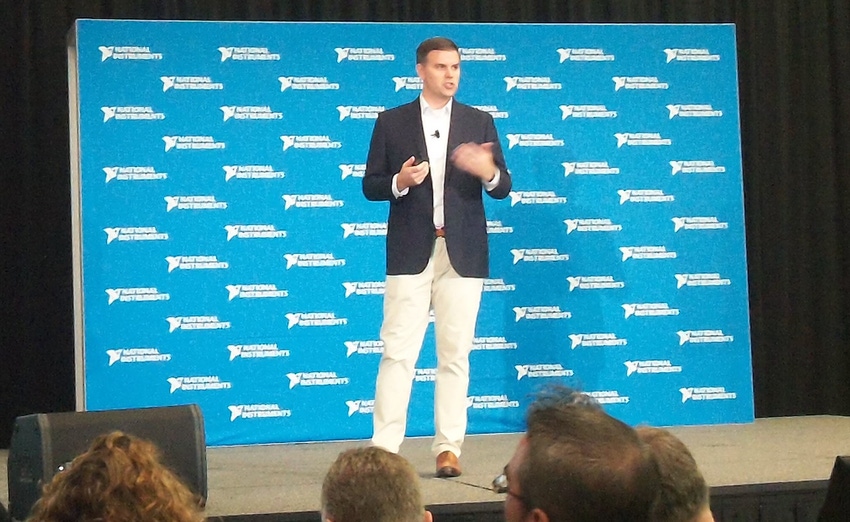NI Debuts Test Software for Time-Constrained Engineers
Software includes four new products and an upgrade to the company's mainstay LabView product.
May 22, 2018

To speed the testing of products ranging from 5G phones to autonomous cars and IoT devices, National Instruments is rolling out new software programs today. The software, which is being debuted at the company’s annual NIWeek conference, features four new products and an upgrade to the LabView visual test and measurement software. The rollouts are targeted at a growing number of engineers who are developing and testing complex products in increasingly small time windows, NI said yesterday.
“Time-to-market requirements have been getting more and more intense,” Luke Schreier, vice president of automated test and marketing, said at a press conference in Austin, TX. “If you look at the time left in the product development cycle left for test, it continues to shrink.”
|
Luke Schreier of National Instruments: “Time-to-market requirements have been getting more and more intense.” (Image source: Design News) |
With today’s rollout, NI wants to help engineers meet those shorter time-to-market requirements. The company’s new standalone software products are designed to work with LabView and with each other. They are:
FlexLogger, a data logging software for validation test, which enables engineers to acquire and log synchronized mixed measurements with no programming required.
InstrumentStudio, a software program designed for NI PXI modular instruments, which allows engineers to capture screenshots and measurement results in one view from their suite of instruments. InstrumentStudio is said to make the debug process more intuitive.
SystemLink, an application software for distributed systems management, which helps improve efficiency by providing a centralized interface for automating test tasks.
NI ELVIS III, a virtual instrumentation suite, which helps engineering students gain the necessary skills to build and test their projects.
National Instruments also made improvements to its LabView product. They include more third-party IP tools for programming languages, such as Python, as well as increased deep learning functions for FPGA-based high-performance processing.
Industry analysts said the announcements are a natural evolutionary step for LabView and for National Instruments. “It’s significant for people who have more specific functions within the product test environment,” Bob O’Donnell of Technalysis Research LLC told Design News. “Here, (NI) has this huge general-purpose tool in LabView and there are a lot of people for whom it’s frankly too much. So they’re taking out chunks of it, putting interfaces around them, and providing tools for individuals with particular needs.”
RELATED ARTICLES:
Senior technical editor Chuck Murray has been writing about technology for 34 years. He joined Design News in 1987, and has covered electronics, automation, fluid power, and auto.
2017 Call for Speakers INSPIRE. COLLABORATE. INNOVATE. Atlantic Design & Manufacturing, part of the largest advanced design and manufacturing industry event on the East Coast, is the annual must-attend trade show for discovering the latest in design engineering. Source from the region's most comprehensive collection of cutting-edge suppliers, deepen your expertise with free, conference-level education, and network with thousands of professionals who can help you advance your projects — and your career. From prototyping to full-scale production, one lap of the show floor will help you overcome your toughest manufacturing challenges and keep you up to speed on innovations transforming the industry. Everything you need to take projects to market faster and more cost effectively is here. Click here to register for your free pass today! |
About the Author(s)
You May Also Like





